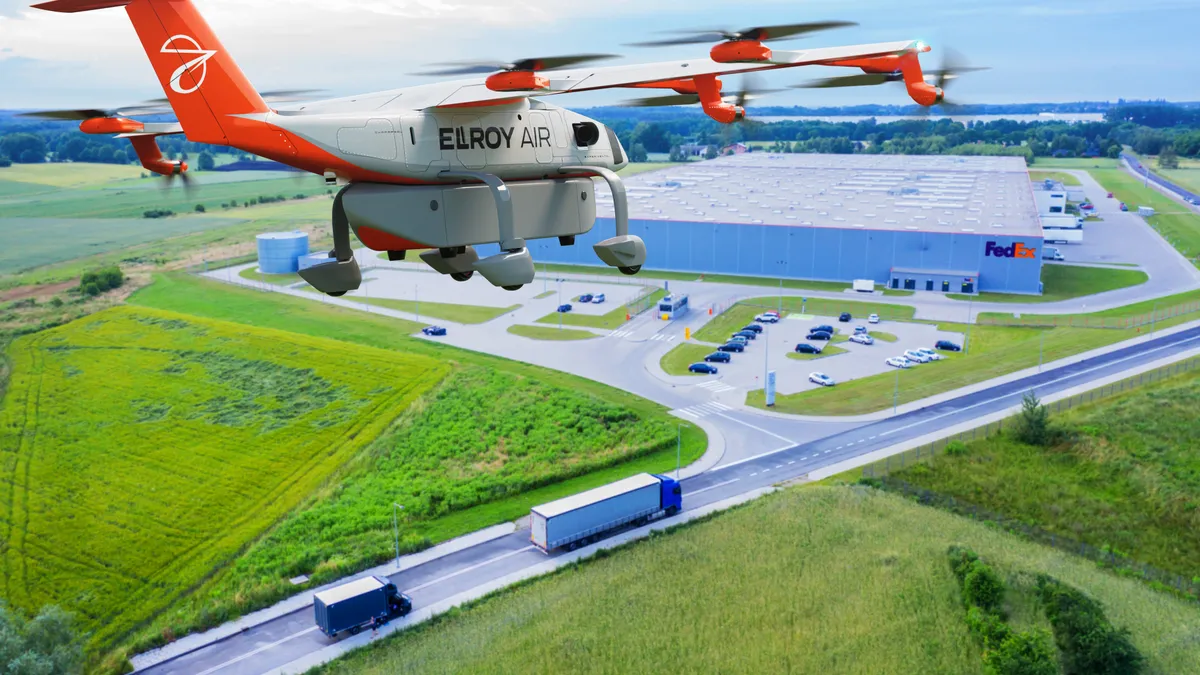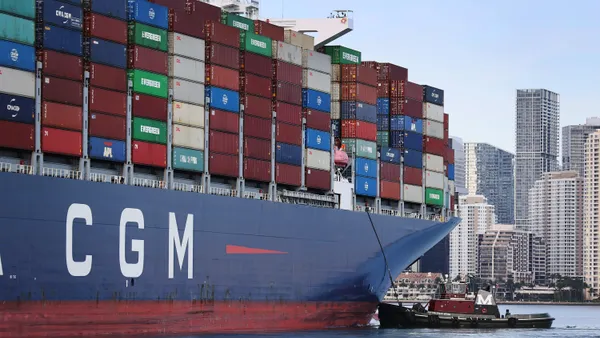Dive Brief:
- FedEx Express will test middle mile autonomous drone delivery through a partnership with Elroy Air as the delivery giant looks to improve operational productivity, efficiency and safety, the companies announced Wednesday.
- Elroy Air is the operator of the hybrid-electric vertical take-off and landing (VTOL) aircraft Chaparral, which FedEx will use in the testing. The aircraft can autonomously pick up between 300 and 500 pounds of cargo and deliver up to 300 miles away.
- Test flights moving shipments between FedEx sortation locations are slated to start in 2023. The companies will work together to identify testing environments both domestically and abroad to perform flights, said Kofi Asante, Elroy Air's VP of business development and strategy.
Dive Insight:
The Chaparral could eventually fulfill a specific need in FedEx's network that its current fleet of aircraft and vehicles can't efficiently provide today, said Joe Stephens, FedEx Express senior vice president of global planning, engineering and technology.
Using VTOL aircraft instead would improve both volume availability and service reliability within FedEx's network, Stephens added. The Chaparral doesn't require airport or charging infrastructure, allowing FedEx to move small levels of volume "in a more direct manner" between hubs, ramps and stations.
"If you're picking up 50 pieces that are going to another station within the radius that we're talking about, that doesn't justify an airplane, and really it doesn't justify a truck, so what you do is you move it through the hub-and-spoke network," Stephens said of a typical middle mile approach.
The Chaparral uses lightweight cargo pods separate from the aircraft itself and pre-loaded by ground personnel, according to Elroy Air's website. Pods are picked up autonomously by the aircraft prior to takeoff. This should reduce the workload for FedEx employees and make operations more efficient, Asante said.
"You want to have high utilization so that you're not spending too much time on the ground," Asante said. "You want to be able to quickly turn around and go, almost like a conveyor belt through the sky where you just continue to pick up and drop off cargo pods across the way."
Elroy Air aims to figure out how it can effectively integrate its aircraft into FedEx ramps and stations as seamlessly as possible for testing, according to Asante. This includes determining with FedEx what freight goes on the Chaparral versus other transportation modes, how many aircraft are required per location and flight takeoff and landing details.
Elroy Air has already secured order agreements for more than 500 aircraft with commercial, defense and humanitarian customers, according to a January news release. Mesa Airlines, a regional airline with partners including DHL, United Airlines and American Airlines, intends to order 150 aircraft for express parcel and healthcare delivery.
"We are increasingly seeing the demand for same and next-day delivery, but so many rural communities have been cut off from the national transportation system. Pilot shortages and environmental regulations make this even more challenging," said Jonathan Ornstein, Mesa Air Group chairman and CEO, in a statement. "With the Chaparral, we're excited to be able to provide autonomous cargo delivery to help reconnect those communities."
Rival UPS is also exploring the VTOL space, announcing last year its plans to buy 10 electric VTOLs from Beta Technologies that should begin arriving in 2024. Vertical takeoffs and landings allow small spaces at UPS facilities to transform "into a micro air feeder network," Beta founder and CEO Kyle Clark said in a news release. Beta's aircraft has a 1,400-pound cargo capacity and a 250-mile range.














